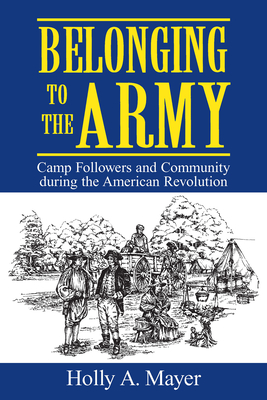Belonging to the Army: Camp Follower and Community During the American Revolution

Belonging to the Army: Camp Follower and Community During the American Revolution
Chronicles the identities and importance of civilians to the American Revolutionary War effort
Belonging to the Army reveals the identity and importance of the civilians now referred to as camp followers, whom Holly A. Mayer calls the forgotten revolutionaries of the War for American Independence. These merchants, contractors, family members, servants, government officers, and military employees provided necessary supplies, services, and emotional support to the troops of the Continental Army. They served in virtually every imaginable capacity, from lifting spirits with food, drink, and dances to nursing the sick, digging ditches, and spying on and fighting against the enemy. Mayer demonstrates that by making encampments livable communities--a matter of some significance given the years it took to acheive independence--these civilians played a fundamental role in the survival and ultimate success of the Continental Army.
In this study of the army as a community rather than merely as a formal military organization, Mayer looks at the formation and administration of the Continental community as well as the meaning of class, gender, and race within in. She considers whether the community contributed to social revolution even as it struggled to effect the independence that was part of the political revolution.
Mayer describes how the military initially wanted to be rid of most camp followers, but, unable to fulfill its own support functions, assimilated the civilians and thus gave an expansive meaning to the term "belonging to the army." She documents how such assimilation included attempts to make camp followers "invisible" and to make them fit the army's visionary image. Mayer shows that in actuality, the military failed to conceal and recast the civilians' efforts and that invisibility only enveloped the camp followers as the nation chose to remember selectively who belonged to army.
PRP: 245.32 Lei
Acesta este Prețul Recomandat de Producător. Prețul de vânzare al produsului este afișat mai jos.
220.79Lei
220.79Lei
245.32 LeiLivrare in 2-4 saptamani
Descrierea produsului
Chronicles the identities and importance of civilians to the American Revolutionary War effort
Belonging to the Army reveals the identity and importance of the civilians now referred to as camp followers, whom Holly A. Mayer calls the forgotten revolutionaries of the War for American Independence. These merchants, contractors, family members, servants, government officers, and military employees provided necessary supplies, services, and emotional support to the troops of the Continental Army. They served in virtually every imaginable capacity, from lifting spirits with food, drink, and dances to nursing the sick, digging ditches, and spying on and fighting against the enemy. Mayer demonstrates that by making encampments livable communities--a matter of some significance given the years it took to acheive independence--these civilians played a fundamental role in the survival and ultimate success of the Continental Army.
In this study of the army as a community rather than merely as a formal military organization, Mayer looks at the formation and administration of the Continental community as well as the meaning of class, gender, and race within in. She considers whether the community contributed to social revolution even as it struggled to effect the independence that was part of the political revolution.
Mayer describes how the military initially wanted to be rid of most camp followers, but, unable to fulfill its own support functions, assimilated the civilians and thus gave an expansive meaning to the term "belonging to the army." She documents how such assimilation included attempts to make camp followers "invisible" and to make them fit the army's visionary image. Mayer shows that in actuality, the military failed to conceal and recast the civilians' efforts and that invisibility only enveloped the camp followers as the nation chose to remember selectively who belonged to army.
Detaliile produsului











